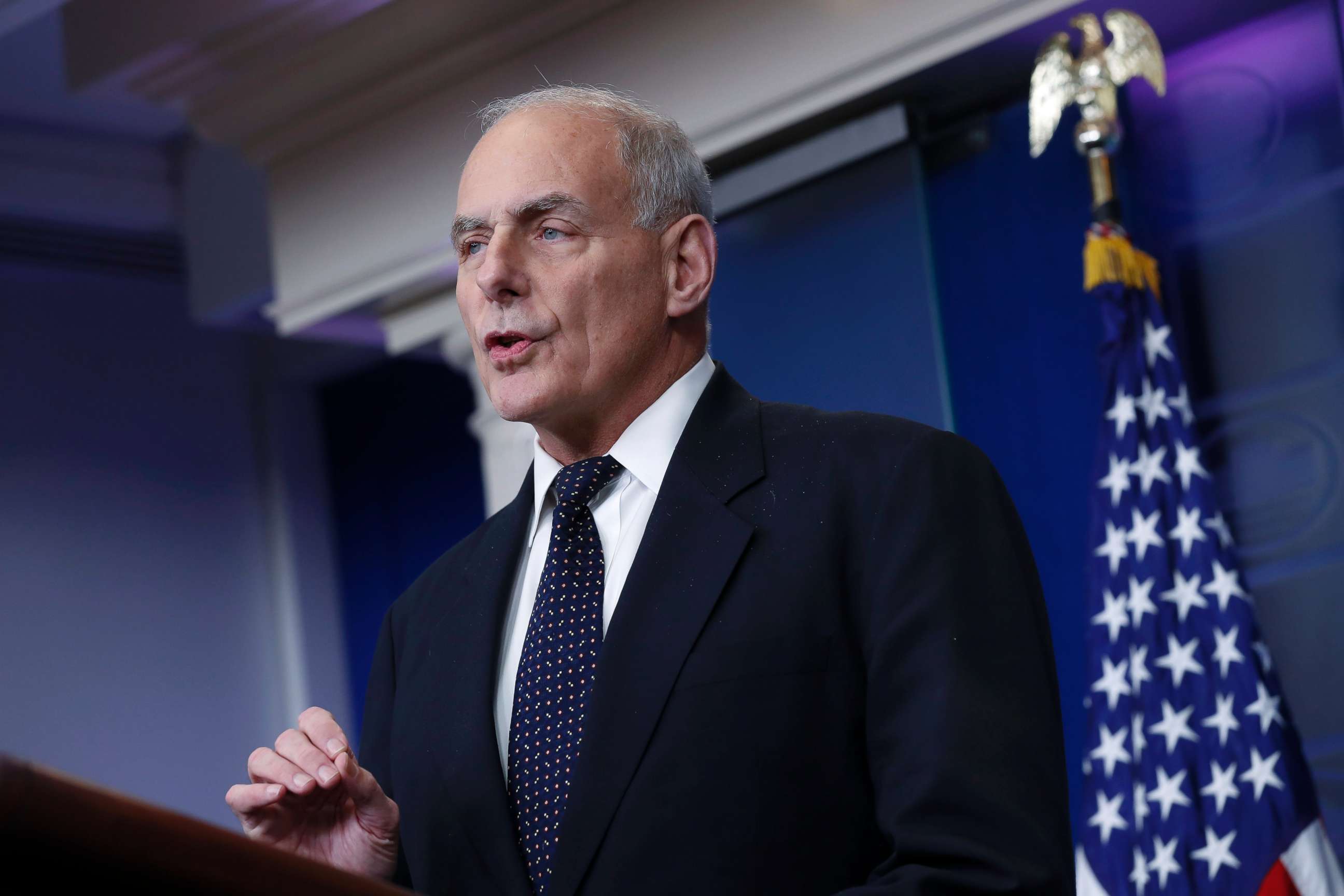DACA Negotiators Look to January for Possible Fix
Sen. Dick Durbin (D-Illinois) said, “We have a long way to go."
— -- Top Senate negotiators, feverishly working behind closed doors in recent days, say Republican leadership, including the president, has committed to bring a bipartisan deal to the floor in January to protect undocumented immigrants brought to the U.S. as children, though prospects for such a compromise are unclear.
While another bipartisan meeting was scheduled for Wednesday evening and sources tell ABC that progress is being made, lead Democratic negotiator Sen. Dick Durbin (D-Illinois) offered a less sanguine assessment, saying, “We have a long way to go.”
That statement was in marked contrast to one he made just a day earlier that the negotiators were “getting closer.”
In part, the Illinois senator blamed the administration.
White House Chief of Staff John Kelly, along with Kevin McAleenan, Acting Commissioner of U.S. Customs and Border Protection, and Border Patrol Chief Ronald Vitiello, attended a meeting last night in the Senate office of Democratic Whip Durbin.
Republican Senators, including Durbin’s counterpart, John Cornyn of Texas; Jeff Flake of Arizona; South Carolina’s Lindsay Graham; Thom Tillis of North Carolina; Oklahoma’s James Lankford; along with Democrat Michael Bennett of Colorado were among the attendees.

Kelly and his team, according to Flake, laid out their expectations for the border security component of the legislation, a must-pass part of any compromise in order to secure the necessary 60 votes to avert a filibuster.
Durbin said it was the first time the White House had joined the bipartisan talks, but according to the senator, “Their requests go way beyond what we thought we would be willing to do for border security.”
But Durbin said he would wait to see the administration’s full proposal that Kelly promised would be delivered by week’s end.
Flake described the expected Kelly plan as a more detailed “punch list of items related to border (security) but not really border (security),” adding that the list includes changes to policies on asylum and those that deal with newer childhood immigrant arrivals.
Flake, a lead negotiator, disagreed with Durbin in evaluating the Administration’s request, saying what was outlined by Kelly was “much more realistic, frankly, than what they’ve proposed in the past, in terms of border.”
But Flake said the White House push to limit chain migration and end the visa lottery program, altogether, could go too far.
The group, according to aides to participating senators, is trying mightily not to have any compromise bill turn into a default comprehensive immigration reform effort, something many see as sure to kill any measure.
“My guess is, the White House will want to deal with more than we want to deal with,” Flake said. “This is a DACA bill. We might deal with chain migration,” but, the senator said, “the scope will be dealing with chain migration related to the population we’ll be dealing with in the bill...We have to get this done by March 5. We’ve got to be realistic about what we do.”
Nearly 700,000 undocumented immigrants are currently enrolled in the Deferred Action for Childhood Arrivals (DACA) program and could face deportation if Congress fails to act by March 5, 2018.
President Donald Trump in September rescinded his predecessor’s 2012 executive action that protected this group.
Flake outlined three key sticking points that have also bedeviled past reform efforts: the scope of who would be protected, whether citizenship is a possibility for this group, and the time frame by which anyone brought into the country illegally as a child would qualify under the program.
Lankford, in a brief interview with ABC, seemed to agree with Durbin’s less than enthusiastic assessment, casting doubt on the idea that a DACA fix could be completed in January, saying, “We hope to have the outline by January, but there are still an awful lot of moving parts. In immigration, anything that you discuss has something else attached to it that has to be addressed.”
If a compromise is not found by the end of January, it could negatively impact thousands of Dreamers. In 2012, after President Obama instituted the DACA program through executive action, it took 90 days from the announcement to set up the program to be able to accept the first applications.
For his part, Senate Majority Leader Mitch McConnell weighed in Wednesday night confirming the January promise, but he also touted a bill vehemently opposed by Democrats that would temporarily extend DACA for three years while beefing up border security and interior enforcement, a potential warning sign for negotiators.
Flake said it was unclear whetherntheir compromise legislation would be attached to a must-pass omnibus spending bill or temporary government funding bill due on the floor later in January, but he said that was his preference.
Supporters of DACA had hoped to have a legislative fix by year’s end with many hoping Democrats would threaten a government shutdown if no bill materialized.
But Democrats were deeply divided on whether to risk a shutdown. A number of members up for re-election next year would not countenance such a move.
Greisa Martinez, Policy and Advocacy Director of pro-DACA group United We Dream, a self-described “undocumented and unafraid” Dreamer, on Tuesday called on members to keep their promise of a fix before Christmas, threatening to bring hundreds of activists to the Capitol if not.
Martinez, who said she had just finished training 400 protesters, noted Democrats would be held accountable, as well as Republicans.
Asked what he would say to supporters who feel betrayed by Democrats, Durbin, who supported the shutdown showdown and is the original author of 2001 legislation to shield this group of immigrants, said, “I’m sorry.”




